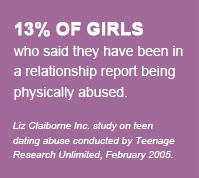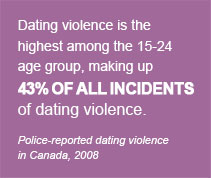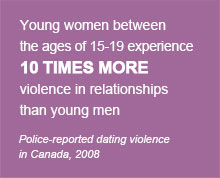
SAFETY ALERT:
If you are in danger, please use a computer in a safe place or call 911. You can leave this site quickly by clicking on Quick Escape
Young Men |
Young Women |
Is Your Relationship Healthy? Break the Silence.
Not sure if you're in a healthy relationship? Click on the toolkit and watch these videos as young men and women share what they bring to a healthy relationship and what is expected in return. These videos were created by The Broadway Neighbourhood Centre's JustTV program and the Manitoba government.
What does a healthy relationship look like?
Healthy relationships are based on mutual trust where both partners are supportive of each other and respect each other's privacy; both partners should feel safe. Being in a healthy relationship means both partners are able to speak about things that are bothering them and both partners listen and support each other as equals. Both partners in a healthy relationship are able to have friends and interests outside of their partner.
Every one deserves to be in a healthy relationship free from violence and abuse.
Which of these sounds like your relationship?
- > You and your partner feel safe and share how each other are feeling.
- > You and your partner listen to and respect each other.
- > You can spend time apart, pursuing separate interests and friends.
- > You can disagree and talk to each other about it in a respectful way.
- > Your disagreements often turn into fights.
- > Your partner is jealous if you talk to other guys or girls.
- > You are embarassed to say how you are feeling because your partner will not care.
- > Your partner treats you with disrespect, ignores you are makes fun of you.
- > Your partner orders you to not talk to other guys or girls.
- > Your partner does not allow you to spend time doing things on your own.
Violence is a serious issue.
Dating violence is a very real and serious issue. Early experiences of dating violence can have an impact on future patterns of violence for both victims and abusers.
Abuse can take the form of:
- Emotional abuse such as making threats, jealousy, criticizing, degrading or insulting someone;
- Physical abuse including shoving, slapping, choking, punching, kicking, biting, burning, hair pulling, and threatening someone with a weapon;
- Sexual abuse including sexual acts without consent, unwanted touching and sending unwanted sexual images electronically
- Stalking or controlling who you see and where you go.
If you're experiencing any abuse, you're not alone. Statistics show that:
 |
 |
 |
See how local youth are helping raise awareness about violence against women.
Need Help?
If you think you are in an abusive relationship tell someone a teacher, a counsellor, an Elder, a coach or a family member. If that person doesn't take you seriously, tell someone else.
For confidential help call: 1.877.977.0007
Klinic Crisis Line is 204-786-8686 or 1-888-322-3019 Kids Help Phone is 1-800-668-6868
If you think you are in immediate danger call 911 now.



